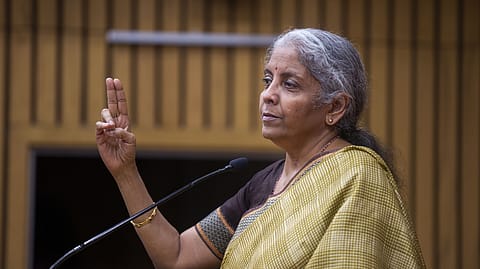Economic Survey 2025: Exports of goods and non-factor services jump 5.6% in H1 FY25
In the second quarter of FY25, imports of goods and services contracted by 2.9%, driven by a decline in commodity prices.

India’s exports of goods and non-factor services at constant prices grew by 5.6% in the first half of FY25, while imports saw a modest increase of 0.7%, according to the Economic Survey 2025 presented by Union Finance Minister Nirmala Sitharaman. In the second quarter of FY25, imports of goods and services at constant prices contracted by 2.9%, driven by a decline in commodity prices. Consequently, net exports made a positive contribution to real GDP (gross domestic product) during this period.
The industrial sector in India expanded by 6% in the first half of FY25, with strong growth of 8.3% in the first quarter. However, growth slowed in Q2, influenced by three primary factors. Firstly, manufacturing exports witnessed a significant slowdown due to sluggish demand from destination countries and the impact of stringent trade and industrial policies in key trading nations. Secondly, monsoon disruptions had mixed effects—while they benefited reservoirs and agriculture, they adversely affected sectors such as mining, construction, and, to some extent, manufacturing. Thirdly, the shift in festive season timing between September and October over the past two years contributed to a slight slowdown in Q2 FY25 growth.
India’s external sector showed mixed trends, influenced by volatile global conditions. A drop in commodity prices specifically impacted India’s merchandise exports through the petroleum goods channel. Merchandise trade data indicates that India’s merchandise exports grew by 1.6% year-on-year during April–December 2024. “However, non-petroleum exports (on the same comparison basis) were up by 7.1%. Non-petroleum and non-gems-and-jewellery exports rose by 9.1%.”
On the import front, merchandise imports rose by 5.2%, driven by an increase in non-oil, non-gold imports. “Gold imports also grew, influenced by higher global prices, early purchases ahead of festive spending, and demand for safe-haven assets.”
The Economic Survey evaluates the country’s infrastructure, agriculture, and industrial growth while highlighting sectors with promising potential. It is compiled by a team led by Chief Economic Adviser V. Anantha Nageswaran.
While merchandise imports weighed on the trade balance, India's booming services exports have propelled the nation to secure the seventh-largest share in global services exports. “In addition to the services trade surplus, remittances from abroad led to a healthy net inflow of private transfers.”
India topped the global list for remittance receipts, driven by increased job creation in OECD (Organisation for Economic Co-operation and Development) economies, according to the World Bank.
Recommended Stories
Consequently, India’s current account deficit (CAD) remains relatively contained at 1.2% of GDP in Q2 FY25.